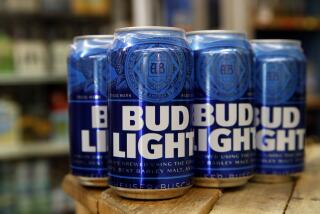Suds Fly in Battle of the Budweisers
- Share via
CESKE BUDEJOVICE, Czech Republic — It’s the battle of the Buds.
A nearly century-long trademark dispute is intensifying between Anheuser-Busch Cos., the world’s largest brewer, and tiny Czech producer Budejovicky Budvar. With both claiming that they produce the only genuine Budweiser beer, they’ve taken their sudsy squabble to courts in 24 countries worldwide.
Budvar won the latest round in South Korea, where a court ruled last month that the company’s name and trademark doesn’t conflict with Anheuser-Busch or infringe on its rights. But elsewhere, the fight continues.
“It’s part of our business -- a big burden, but we’ve gotten used to it,” said Jiri Bocek, Budvar’s general director.
Budejovicky Budvar was established in 1895 in Ceske Budejovice, called Budweis at the time by the German-speaking people who formed about 40% of the area’s population. Beer has been known here for centuries as Budweiser.
The founders of Anheuser-Busch used the name for their product because it was so well-known. The St. Louis-based brewer, founded in 1852, began producing Budweiser, America’s first national beer brand, in 1876.
Disagreements over the trademarks Budweiser and Bud date to 1906.
“It’s a dispute between an original beer producer from a particular location and another one that just used the well-known name of the location for its product made in the United States,” Bocek said.
Anheuser-Busch, however, claims that it started using the Budweiser brand in 1876 and registered it two years later, 19 years before its Czech rival came into existence.
A 1939 agreement gave Anheuser-Busch sole rights to the name Budweiser in all American territories north of Panama, but a clash was inevitable as the two breweries expanded their exports.
Budvar sells its lager to 60 countries, while Anheuser-Busch says Budweiser is brewed in 10 countries and sold in more than 80 others.
“Anheuser-Busch has unchallenged rights to the Budweiser name in most of the world,” Stephen J. Burrows, president and chief executive officer of Anheuser-Busch International Inc., said in a statement.
The battle of the Buds grew in the mid-1990s after talks aimed at settling the dispute failed and Anheuser-Busch went to court.
“They were talking about a win-win situation for both sides, but in our opinion, what they offered was a win-win situation just for them,” Bocek said.
Although trademark rights usually are granted to only one rival in any given country, a court ruling in Britain allowed both brewers to sell their versions of Budweiser there.
“It was an unusual decision, but consumers are not confused and are able to tell the difference between the two brands very well,” Bocek said.
Meanwhile, Budejovicky Budvar remains a state-owned company in this country where beer is both a source of national pride and a major export.
In 2002, Budvar posted a profit of $10.3 million, and it expects a profit of about $13.3 million for 2003.
Budvar was to be privatized after the fall of communism in then-Czechoslovakia in 1989, and foreign brewers, including Britain’s Bass and Denmark’s Carlsberg, at one point expressed interest in adding Budvar to their holdings.
Foreigners already own Budvar’s main domestic rivals: South Africa’s SAB Miller acquired Pilsner Urquel and Belgium’s Interbrew controls Staropramen.
Czechs, the world’s biggest per capita beer drinkers, seem content to keep Budvar in their own hands.
“I would never sell Budvar to [Anheuser-Busch],” said Ivan Hoffmann, a businessman from Ceske Budejovice enjoying a pint of Budvar with friends in a local restaurant.
“Their beer is sinister,” he said.
Budvar lovers abroad share that sentiment. In August, more than 2,000 people in Britain signed a petition by the Campaign for Real Ale, a British consumer organization, urging the Czech government not to sell the Budvar company because it could fall into the hands of Anheuser-Busch.
“Budvar is a unique beer,” campaign spokesman Jonathan Mail said.
“We believe the only way to protect its long-term future is to maintain Czech ownership.”
Budvar fans may well get their wish.
Martin Severa, spokesman for the Ministry of Agriculture, said the company’s privatization “is not on the agenda.”
But Bocek concedes that the state might not own its beloved nectar forever. “The question only is when and how,” he said.
More to Read
Inside the business of entertainment
The Wide Shot brings you news, analysis and insights on everything from streaming wars to production — and what it all means for the future.
You may occasionally receive promotional content from the Los Angeles Times.










